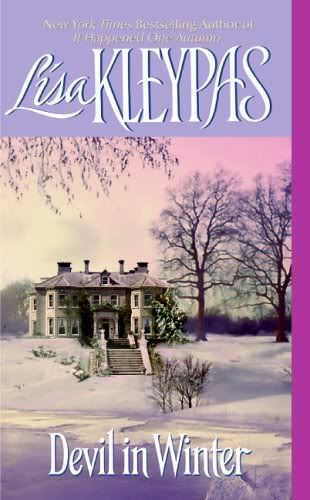
It's time for a new feature here at Damned Scribbling Women, particularly since we've finally managed to attract a few readers other than friends, family and those forced by future conjugal ties to pretend an interest in our writing.
Here it is, the first Friday Review, this time of Lisa Kleypas' The Devil In Winter, out in March.
My introduction to Kleypas (in college) was through her Bow Street Runners series, and I have to say, I wasn't a fan. Maybe it was the romantic suspense-y vibe, but I wasn't all that fond of the characters, didn't love her writing, just didn't get the appeal.
But when she started her new Wallflowers series (and I got the first book free) I decided to give it a try. I loved Secrets of a Summer Night, from the unabashadly mercenary heroine, to the rough and middle-class hero to the delightful group of friends that I knew would form the heroines of the following books (not an Amy March among them). I liked the second book, It Happened One Autumn, the story of brash American heiress Lillian and starchy aristocrat Marcus, even better.
Fortunately, Kleypas' streak holds in this third book in the series. The hero is a familiar type in historical romance, the dissolute rake who thinks he's much worse than he is, but the fact of his having been the villain in the previous book adds interest, and he thankfully doesn't spend too much time wallowing in guilt over his stained past. He also demonstrates a marvelous energy in turning around a decayed gambling club once he gets hold of it that I enjoyed. Not often we see aristocrat heroes doing anything other than thinking about drainage and their tenants and possibly allowing a railway on the property (when not tearing bodices, of course).
The heroine, Evie, is really marvelous. She's painfully shy, with frizzy red hair and a stutter. She's the daughter of a respectable woman and the up-from-the-streets owner of the aforementioned gambling club, and after her mother's death she was brought up by her strict and abusive maternal relatives. She's incredibly appealing: strong-willed and determined without being irritatingly or stupidly pig-headed (as a lot of "modernized" historical heroines can be).
The tone of the book is perfect, just the right mix of light humor, percolating suspense, and inner turmoil. And the series' other characters are used sparingly but well.
In fact, the book's so good it makes me regret that after the last Wallflowers novel, Scandal In Spring, Kleypas will be turning to contemporaries (romantic suspense, I believe, which I find really tedious). Please don't stay away too long, Lisa! We need more decent historicals!





